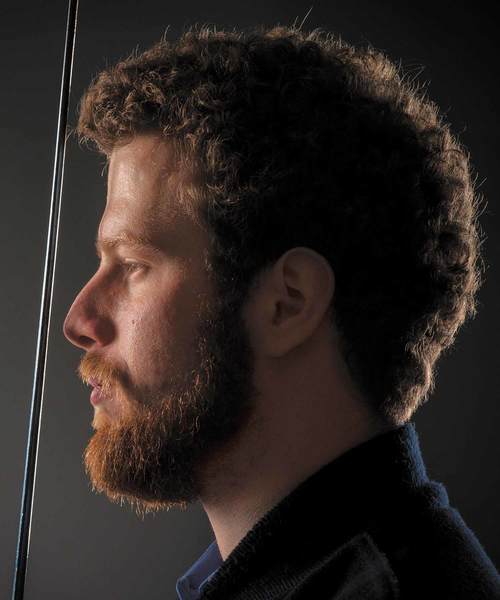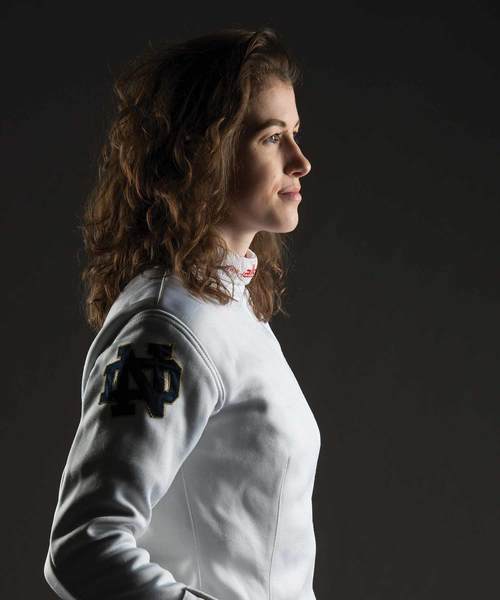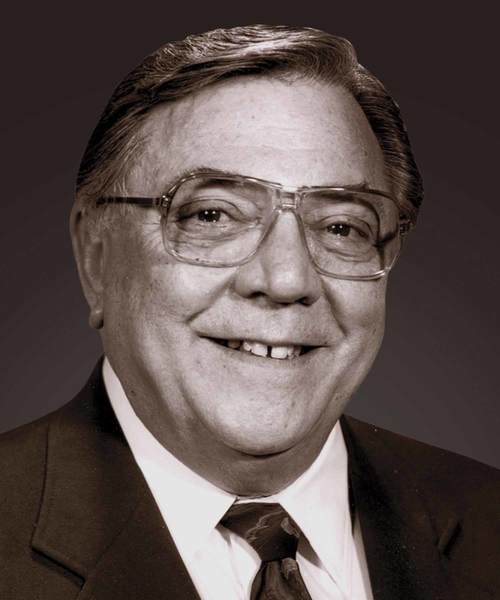
Alex Coccia
He has a point
Vince Lombardi once said that a man’s finest hour is “that moment when he has worked his heart out in a good cause and lies exhausted on the field of battle—victorious.”
The words of the legendary football coach have inspired and defined many of the pursuits of Alex Coccia, a University of Notre Dame senior who has given his all as a leader, scholar and champion in the sporting arena and beyond.
Before joining the Irish fencing team as a freshman, Coccia was a high school standout in the sport. Under the guidance of Ohio State head coach Vladimir Nazlymov at Fencing Alliance of Ohio in Columbus, Ohio, he earned a national ranking each year and a state championship his sophomore year. It was Nazlymov who first introduced Coccia to the Lombardi quote, which was imprinted on the club gym as a daily reminder of what it takes to be number one.
Carrying that fighting spirit with him to college, Coccia completed his freshman season at Notre Dame by wielding his sabre to a 20-7 record, contributing to the team’s 2011 national championship. His next move? In true Notre Dame student fashion, he found a way to turn his passion into an opportunity to serve and engage, taking his love of the sport to Africa, where he spent the following summer teaching Ugandan school kids to thrust, dodge and parry through the nonprofit organization Fields of Growth International, which until that point had been entirely focused on lacrosse.
“I didn’t know lacrosse, but I asked if I could switch it to fencing and they were fine with that,” he says. “So I brought over 60 foam sabres and after school we would have fencing class.”
It took a little while for the kids to get the hang of it. “They just wanted to hit each other at first, but it’s the same with kids here too, so I was sort of expecting that,” he says. “But once we structured it and formalized the class, they started to get the footwork down and they could move well. They started to understand the rules and it was a lot of fun for them.”
For Coccia, who also taught social studies at the Ugandan school, one of the biggest surprises was how good the students got, how quickly, and the way the sport caught on. “The thing that I really loved was that the teachers and others in the community loved it as well. They had no idea what it was, but they saw the kids having fun, so they knew it was a good thing.”
One of the best parts of the experience was seeing friendly competition emerge between the two schools in the village. “They wanted to compete against each other and after our first tournament, one of the students said next time they were going to host it. I loved hearing that there was going to be a next time.”
It was during that summer trip that Coccia made his first visit to Rwanda, a country that had captured his attention in high school as he was working on a social justice group he had founded to raise funds for Catholic Relief Service efforts in Darfur, Sudan. “When I was raising money for Darfur, I started reading about the Rwandan genocide, with people making connections between Darfur and Rwanda. I became more and more interested in the history of Rwanda, especially post-1994, and so when I knew I wanted to do research, I figured I wanted to do something on Rwanda.”
What he saw on his one-week excursion made a lasting impression. “I certainly knew to expect the memorial sites, but I guess I didn’t necessarily realize how tangible they would be within the communities.” One of the most profound moments came when he visited a former schoolhouse on the top of a hill in a local sector, where people had fled during the genocide and received French protection for a period of time. It ultimately ended in horrific tragedy, with the slaughter of everyone inside, and some of the bodies remain entombed in the building. “It was striking to me how present it still is, in people’s minds and in the conscious history of Rwanda at this time.”
As a peace studies and Africana studies major and a member of the Glynn Family Honors Program, Coccia has concentrated his academic pursuits on reconciliation and development in post-conflict societies, conducting extensive research during a second trip to Rwanda the summer after his sophomore year.
“What I really appreciate about doing research in Rwanda is it was so qualitative, so it was all about conducting interviews and getting to a level of trust with people so they would talk to you, and also just understanding the complexities of human emotion and human nature.”
One particularly memorable experience came during an interview with a genocide survivor, a woman who made a surprising gesture during their conversation.
“A guy walked past and she called him over so I could interview him also, and it turned out this was the person who had killed her whole family,” he says. “He had confessed and named others who had not admitted their guilt, so he had been released as part of the Gacaca court system. I interviewed them side by side and it was such a powerful moment to see how they interacted together.”
The trip also had its light moments, with two weeks back in Uganda for another session of fencing class, including that “next time” tournament that had been discussed on his first visit. When Coccia returned to campus for his junior year, his star was rising as a student leader. As co-president of the Progressive Student Alliance since the end of his freshman year, he was a driving force in the 4 to 5 Movement, a student initiative in support of LGBTQ inclusion on campus.
“Coming to Notre Dame, I heard stories from my dad (a 1972 graduate) about the University’s civil rights legacy, so I came in with a very specific vision of Notre Dame as a premier Catholic university and what that meant on the social justice front,” he explains. “I learned about some of the issues on campus and got involved with the PSA to help raise campus awareness and work for changes in policies.” Through the 4 to 5 Movement, he successfully worked with the Office of Student Affairs to establish an official LGBTQ-Ally student organization.
He took his leadership to the next level by running for student body president during his junior year. To motivate his ticket’s campaign staff, he handed out copies of the Lombardi quote, the same words that had inspired him as a high school fencer. “I told them if we have one shot at something, we’re going to go all out. I had no doubt that if we did it that way, we were going to win.”
And win they did. Since then Coccia has worked tirelessly as an agent of change both on campus and well beyond, earning the respect of peers and mentors alike, all the while continuing his winning tradition as a fencer.
“Alex demonstrates that the pen is indeed mightier than the sword,” said George A. Lopez, the Rev. Theodore M. Hesburgh, C.S.C., Professor of Peace Studies and one of Coccia’s academic advisers. “He is credible, tough, smart and skilled, exceptional in his leadership and vision, and incomparable in his ability to get deeply divided people to meet and talk with one another.”
That knack for diplomacy will play a key role in Coccia’s future endeavors as he plans to pursue a political career. After graduation he will head to Washington, D.C., as a Truman Scholar, an honor afforded to only 60 college students in the nation each year based on leadership potential, intellectual ability and likelihood of “making a difference.” The scholarship includes $30,000 in graduate study funding, leadership training and internship opportunities within the federal government. His goals include working on a presidential campaign, then attending law school and ultimately working to shape domestic policy.
“Government has so much potential and it’s fundamentally about relationships,” he says, “just like in fencing, where it’s an individual sport, but everything you do reflects on the team.”
Throughout his Notre Dame career, Coccia has kept in touch with some of the Progressive Student Alliance leaders who were seniors when he was a freshman. He says those now-alumni have been pleased to see the progress that has been made with regard to sexual orientation inclusion on campus since they graduated. He similarly looks forward to following along as the next crop of student leaders continues to build on the momentum he is helping to create in a number of areas, leading to an even stronger student body.
“Five years from now I’d like to see that attitudes have changed, particularly regarding sexual assault and that the comfort level around reporting incidents and supporting survivors has increased.
“In one recent student survey, Notre Dame had a 93-percent ‘satisfactory’ response in the category of sense of community. Which is well above our peers,” he notes, “but we hold ourselves to higher standards.”
Spoken like a true champion—working his heart out in a good cause…or several, and always playing to win.

